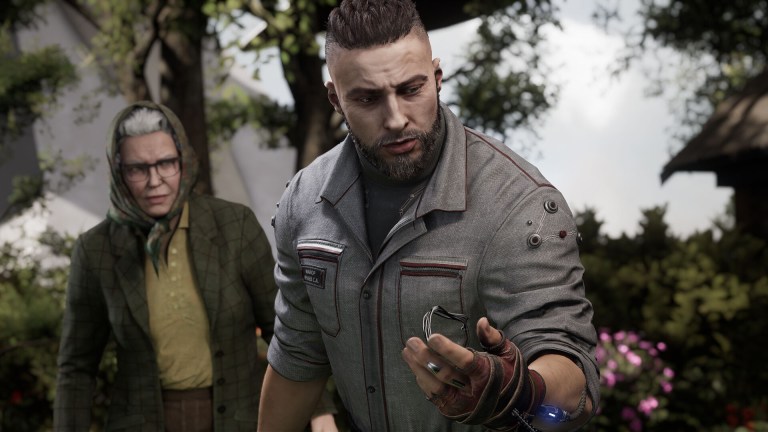Atomic Heart Controversy Explained: Why Is the Game Being Protested?
Atomic Heart has been the subject of an incredible amount of scrutiny since its debut. Here's what you need to know about this situation.

Atomic Heart (one of the biggest new games of 2023) is currently being protested and boycotted by Ukrainian officials, individual gamers, and other sources over the game’s subject matter and alleged ties to influential Russian sources.
While this situation is ongoing and still developing, here’s what you need to know about the controversy surrounding the game up until this point.
Why Is Atomic Heart Being Boycotted?
Most of the Atomic Heart boycotts and protests we’ve seen so far can be attributed to concerns regarding the game’s possible association with prominent Russian individuals and institutions.
Developer Mundfish describes itself as a “video game development studio headquartered in Cyprus” that is “led by a talented global team.” However, key members of its initial team are originally from Russia, and the developer is still described as a Russian studio by certain sources (including Russian media). Historically, the Mundfish team hasn’t been very open about their Russian origins and possible ongoing ties to Russia (including reported Russian business mailing addresses).
While that is not necessarily an issue in and of itself, Mundfish drew criticism earlier this year when they made numerous vague and non-commital comments about their stance on the war in Ukraine and allegedly began blocking users who asked further questions about their political stance. While it has been pointed out that their refusal to comment further could be due to a number of legal and procedural factors, their approach struck many gamers and industry members as vague at best and worrying at worst.
More recently, a Ukrainian YouTuber named Harenko posted a video called “Please, Don’t Buy Atomic Heart.” He criticized, among many other aspects of the game, the developer’s “we don’t comment on politics” stance and brought up concerns about many aspects of the game and Mundfish’s practices. Among those concerns were references to Russian investors and other organizations that could influence Mundfish’s practices.
Eurogamer, PC Gamer, and other outlets expanded on that last point by shining a light on one of Mundfish’s primary investors, GEM Capital. That company is based in Russia and was founded by Anatoliy Paliy, who was previously an executive for the Russian state-owned energy company, Gazprom. Furthermore, outlets discovered that Atomic Heart will release on VKPlay in Russia. What is VKPlay? A Russian digital distribution service owned by the Russian social media platform VKontakte (essentially the Russian equivalent of Facebook), which is also owned by Gazprom. Those connections raised concerns regarding not just Atomic Heart‘s possible ties to prominent state-owned industries but the idea that its success could in some way fund Gazprom’s controversial endeavors and other possible government agendas (including the invasion of Ukraine).
There’s also the matter of the game’s subject matter. Anyone who plays or even views Atomic Heart knows the game is slathered in Russian themes as part of its alternate history narrative that imagines a sci-fi USSR utopia. Some find those themes to be too much to accept at a time when Russia faces global scrutiny for its invasion of Ukraine (and other policies), though Mundfish has faced additional scrutiny over their choice to emphasize the game’s USSR utopia concepts in their marketing and during press events. Of course, it should be noted that Mundfish began developing Atomic Heart long before the invasion of Ukraine, though that brings us back to the company’s non-commital responses on that issue. While you could certainly say that there was a degree to which Atomic Heart‘s subject matter was always going to be controversial, the timing of the game’s release in relation to the Russian invasion of Ukraine (it was released exactly one year after the start of the invasion) has certainly caused the game to face further scrutiny.
Is There Any Controversial Content in Atomic Heart?
Many gamers are boycotting Atomic Heart out of a show of solidarity for Ukraine and out of a possible fear that buying it could indirectly fund the Russian invasion and similar controversial actions. However, some have also found content in the game that they object to on relatively similar grounds.
While Atomic Heart is mostly filled with fast-paced gunplay and physics puzzles, the game lets players take a breather in save rooms. To help take the edge off, these areas include televisions that play the cartoon Nu, Pogodi! (literally Well, Just You Wait!). That show is a very real piece of Russian programming (it’s similar to Tom and Jerry), although it is anachronistic to the setting of Atomic Heart since the show started airing in 1969. The game displays the 12th episode of Nu, Pogodi!, which takes place in a museum. That episode includes a fairly racist statue of what is presumably an African tribesman. It’s a questionable inclusion made that much stranger by the fact that the show wouldn’t even have existed in the year the game takes place.
Even if you haven’t seen gameplay for Atomic Heart, odds are you have at least spied its mascots: a pair of 9-foot tall ballerina robots with form-fitting skins and extendable claws. These gynoids are plastered everywhere in the game’s ads and give off the same vibes as Resident Evil 8’s Lady Dimitrescu. What makes them controversial? Their hair. Some think their stylish braids might be a reference to former Ukrainian Prime Minister Yulia Tymoshenko. People who noticed this seeming connection were outraged since the towering twin robots are sometimes portrayed to be, as Twitter user Dinka Kay put it, “sex slave robots.” Giving them the hairdo of a notable Ukranian political leader who risked her life to ferry medicine to sick children and then transport the kids to safer locations was seen as a deliberate insult by some. It could certainly be a coincidence, but it’s one of those things that are at least seen as a questionable choice given the context of everything surrounding this game.
While those are some of the more notable pieces of questionable in-game content that have been found so far, the bigger issues are the pieces of in-game content related to the worries about the game’s association with Russian businesses and government officials. So far as that goes, many people may find objectionable content throughout Atomic Heart given the nature of the game.
Is Atomic Heart Intended to be Russian Propaganda?
As previously stated, Atomic Heart is drowning in USSR imagery. While covering a game in location-appropriate iconography and architecture isn’t necessarily controversial, some have expressed their concerns that the very nature of the game can be interpreted as a powerful piece of propaganda.
One of the strongest proponents that Atomic Heart is filled with propaganda is the Ukrainian government. Recently, Ukraine’s Ministry of Digital Transformation released a statement claiming it would contact Valve, Sony, and Microsoft to request an immediate ban of the game (at least in Ukraine). According to the country’s Deputy Minister of Digital Transformation, Alex Bornyakov, Atomic Heart “has Russian roots and romanticizes communist ideology and the Soviet Union.” While the Ukrainian organization is primarily targeting the distribution of the game in its home country, it urges gamers over the world to avoid Atomic Heart due to what Bornyakov calls its inherent “toxicity,” and will also pursue avenues to limit sales of the game in other countries.
The game’s composer, Mick Gordon, also donated all the money he made working on Atomic Heart to the Australian Red Cross’ Ukraine Crisis Appeal as a sign of solidarity. Other gamers have chosen to take similar steps to protest the game.
Here’s what our own Matthew Byrd, who has played through the game’s campaign, has to say about the game’s propaganda controversy:
If Atomic Heart is a piece of propaganda, it’s certainly not an obvious one. Without diving too deep into spoilers, the game clearly questions the utopia narrative we see at the beginning of the game. Furthermore, it addresses and criticizes the idea of certain political principles being used as a smokescreen for more dangerous agendas. It’s a pretty obvious parody in many ways. While that doesn’t address some of the other concerns regarding the game or the idea that its existence could distract people from other issues, the game doesn’t seem to be any kind of traditional piece of propaganda in the popular sense of that idea.
Is Atomic Heart Being Used to Collect and Sell Data?
One of the most notable accusations against Atomic Heart involves the idea that the game could be collecting user data that would then be shared with the Russian government or Russian businesses.
According to the website Ain.capital, Mundfish’s privacy policy includes a clause stating the company will collect user data and send it to Russian authorities, specifically the Federal Security Service of the Russian Federation (FSB). Moreover, Ain.capital claims this policy cites Russian mobilization laws, the very same ones used to recruit Russian citizens to invade Ukraine. GamesRadar+ reached out to Mundfish for comment, and a representative fired back against Ain.capital, claiming that the information the site used was “outdated and wrong.” According to this Mundfish employee, the studio doesn’t collect any information, although as GamesRadar+ pointed out, the Mundfish representative neither confirmed nor denied if the company actually used to harvest data for the Russian government.
At present, there is no definitive proof that Mudfish is using Atomic Heart to collect and sell user data. That practice is certainly not unheard of when it comes to software, though, so (like many other aspects of this story), it’s something that we will keep an eye on as this situation develops.
